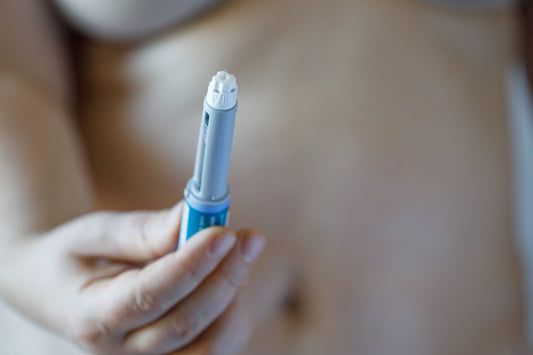As women enter menopause, many experience side effects that are connected to shifts in hormone levels. Women may find these changes cause hot flashes and night sweats, irritability, and weight gain. But there’s another menopause symptom that’s quite common, yet surprisingly few women know about it: dry eyes. According to the Society for Women’s Health Research, about 61 percent of menopausal women suffer from dry, itchy eyes, but only 16 percent connect it to the hormonal changes they are experiencing.
It can be tricky to know whether you’re experiencing dry eyes due to hormonal changes or something else entirely. Here’s what you should know.
Dry Eyes During Menopause: Potential Causes
A healthy tear film is made up of three parts—a water component, an oily component, and a mucin component. Dry eyes can occur when there is a problem within one of these three components. For example, when dry eye syndrome occurs due to a lack of oil in the eye, tears can evaporate too quickly, causing the eyes to become dry and uncomfortable.1
During menopause, levels of the sex hormone androgen will decrease. Androgen is an important hormone because it helps to regulate tissues that maintain tear-film stability and prevent evaporation.2 Both men and women have androgens. It’s now thought that since women have lower levels of androgens to begin with than men do, decreases in these hormones could leave women with less than what they need, causing dry eyes.
Men can experience dry eye too, but are much less likely to have it than women. While there is a connection between dry eyes and hormonal imbalances, it’s important to note that dry eyes may also be a symptom of various environmental factors. Symptoms like ocular burning, itching, dryness, and blurred vision can be caused by allergies. Dry eyes can occasionally be a symptom of serious diseases like diabetes, lupus, Sjogren’s syndrome, and certain autoimmune conditions. Staring at a computer screen for extended periods of time, living or working in a dry climate, and leaving your contact lenses in for too long can also cause dry eyes.3
Symptoms of Dry Eyes
The symptoms of dry eye can be mild and occur infrequently, or they may be constant and difficult to cope with. Permanent loss of vision from dry eyes is uncommon. However, the National Eye Institute (NEI) notes that women who enter menopause prematurely are more prone to experience damage to the surface of their eyes from dry eyes.4
The symptoms of dry eye include the following:
- Stinging or burning in the eyes
- A feeling that something sandy or gritty is in the eye
- Excess tears produced after a period of very dry eyes
- Eye pain and redness
- Occurrences of blurred vision
- “Heavy eyelids”
- Inability to cry when feeling emotionally stressed
- Feeling uncomfortable when wearing contact lenses
- Feeling eye fatigue and having less tolerance when reading, working on the computer, or from other activities that require sustained visual attention
Treatment For Dry Eyes, and Things to Avoid
There are multiple ways to help relieve dry eyes. Some are natural: staying hydrated, eating a balanced diet, and getting enough sleep can help soothe the effects of dry eyes. If that’s not enough, there are options when it comes to products and treatments. But before heading to the drugstore, consider checking in with your healthcare provider: a thorough eye exam can eliminate more serious causes of dry eyes (such as autoimmune diseases) that need to be carefully watched and treated. Your ophthalmologist may suggest lubricating eye drops, which can be bought over the counter in some cases and are otherwise available by prescription.
Laser vision correction surgery, both LASIK and PRK, can make dry eyes worse.5 Certain prescription medications, such as diuretics and anti-depressants, can have that effect as well.
Since there appears to be a connection between changing hormone levels and women’s dry eye symptoms, you’d think that hormone replacement therapy (HRT) used to treat other symptoms of menopause would reduce symptoms of dry eyes. The reverse is true. HRT may increase a woman’s risk of dry eyes or worsen symptoms. A study by The Journal of the American Medical Association shows that increased levels of estrogen during HRT can cause adverse effects on the ocular surface, and that HRT use is significantly related to symptoms of dry eyes.6
All of this is to say: there’s not a one-size-fits-all approach for dry eye relief, and certain medications or treatments can cause or worsen dry eyes as a side effect. If you’re experiencing dry eyes, it’s important to tell your healthcare provider so they can take the symptom into consideration in your overall medical treatment.
When to See a Doctor About Dry Eyes
Whether you’re experiencing dry eyes or not, consider getting your eyes examined annually. This important preventive care visit will help you and your doctors monitor how your eyesight might be affected as you progress through menopause.
If you are experiencing symptoms of dry eyes and think it’s due to menopause, be sure to talk to your healthcare provider before seeking treatment to rule out other potential causes.
Resources
- https://www.allaboutvision.com/conditions/dryeye-syndrome.htm
- https://www.reviewofophthalmology.com/article/hormones-in-dry-eye-a-delicate-balance
- https://www.nei.nih.gov/learn-about-eye-health/eye-conditions-and-diseases/dry-eye
- https://www.nei.nih.gov/sites/default/files/health-pdfs/factsaboutdryeye.pdf
- https://www.allaboutvision.com/conditions/dryeye.htm
- https://jamanetwork.com/journals/jama/fullarticle/194334









Comments
Post commentThis is helpful information. I’ve had extremely dry eyes ever since moving to Arizona over 40 years ago and for years thought it was just environmental and allergy- related. When I was on HRT, no one mentioned a hormonal connection. A few years ago, my new eye doctor noticed a history of Graves’ disease (thyroid) and connected the two, which my endocrinologists had never done. Since then I have received treatment for related inflammation as well, and continue to use prescription and OTC medications.
This is so helpful! I had assigned my itchy eyes to allergies when it wasn’t allergy season. So I would take allergy medicine which probably made everything more dry! Now I willask my doctor about lubricating drops..
Thank you for the information. I’ve suffered from dry red eyes for years after being on HRT I now use plasma eye drops made from my own blood. However treatment is very very expensive and doesn’t travel well. Hopefully we will find more options
Another thing women with breast cancer are not told is that the medications often prescribed can cause the some what rapid onset of dry eye. I was prescribed an aromatase inhibitor 2 years ago to treat estrogen positive BC and dry eye set in within a year. I woke up in horrendous pain one morning and didn’t know what hit me. I was previously on HRT so had the unfortunate double effect of going off hormones and being put on a hormone antagonizer. This not not mentioned in any of the literature and was never mentioned by any of the doctors I saw.
I use sustyane drops and I take evening primrose oil gel caps which helps because my eye doc says my eyes look great